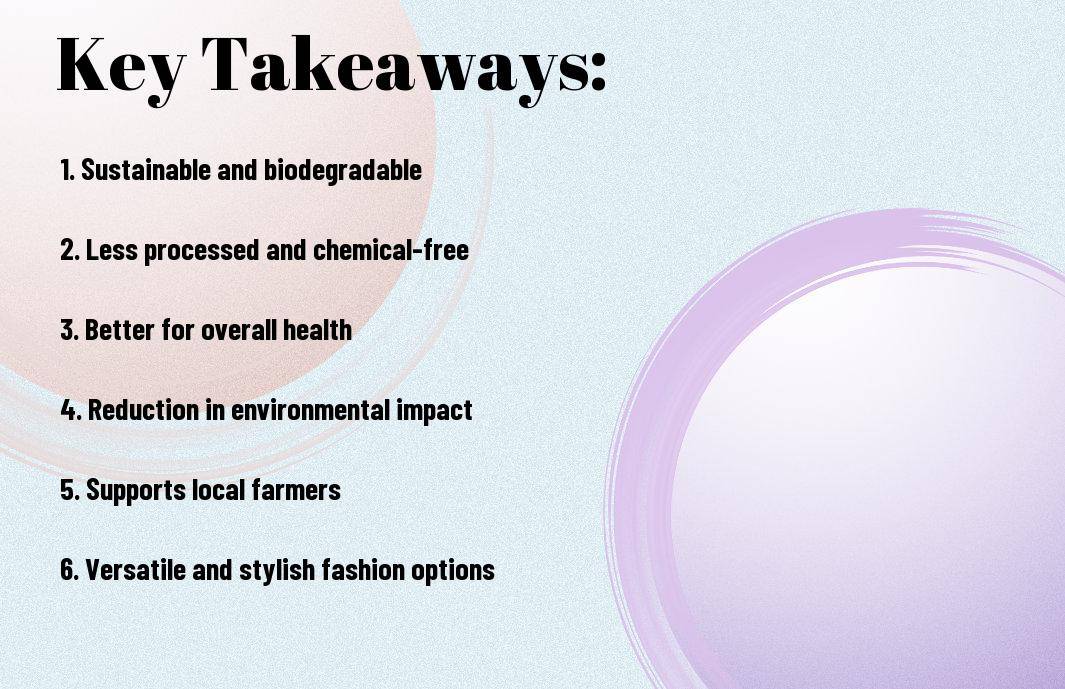
Newsletter Subscribe
Enter your email address below and subscribe to our newsletter

Enter your email address below and subscribe to our newsletter

Most people underestimate the power of natural fibers when it comes to maintaining a healthy diet. Rather than relying on supplements to meet my fiber needs, I have found that incorporating whole foods like fruits, vegetables, and legumes not only provides imperative nutrients but also keeps me feeling satisfied and energized. While some may opt for fiber supplements, I believe opting for natural sources is the way to go for a balanced and healthier lifestyle.

The use of synthetic ingredients in supplements can be concerning. Anytime you see a long list of unpronounceable chemicals on a supplement label, it gives me pause. You have to wonder about the long-term effects of putting these unnatural substances into your body.
An unclear or misleading label on a supplement can make it difficult to know exactly what you’re consuming. Sometimes the dosage or ingredients aren’t clearly stated, leaving you to guess. This lack of transparency can be risky when it comes to your health.
Drawbacks: Unclear labeling on supplements can be dangerous as it may lead to accidental misuse or overconsumption of certain ingredients. Always ensure that the label clearly states the ingredients, dosage, and any potential side effects.
For some supplements, the potential for interactions with medications or other supplements is a real concern. Mixing certain supplements with prescription drugs can have serious consequences. It’s crucial to consult with a healthcare professional before adding any new supplement to your routine.
Labeling: Always read the labels of supplements carefully and be aware of any potential interactions with medications or other supplements. Your health is too important to take risks with unknown combinations of substances.

There’s something satisfying about knowing that the food I eat is in its most natural form, packed with all the nutrients my body needs without any added synthetic ingredients. Choosing natural fibers over supplements means opting for whole foods that offer a multitude of health benefits beyond just fiber content.
The natural fibers found in foods like fruits, vegetables, whole grains, and legumes are high in fiber and low in drama. Unlike some supplements that can cause digestive upset or other side effects, these whole foods provide a gentle and effective way to increase your fiber intake without any unnecessary fuss.
To add to the benefits of choosing natural fibers over supplements, these whole foods are not just good for your digestive health but also for your overall well-being. The fiber they contain helps regulate blood sugar levels, lower cholesterol, and maintain a healthy weight, making them a wise choice for anyone looking to improve their health naturally.
For aiding digestion naturally, nothing beats the power of natural fibers found in whole foods. These fiber-rich foods act as a natural way to promote healthy digestion, prevent constipation, and support a diverse gut microbiome. Instead of relying on supplements that may disrupt your stomach’s natural balance, opting for natural fibers allows you to support your digestive system in a gentle and sustainable way.
To be honest, when I first started my health journey, I was all about supplements. I thought they were the answer to all my problems – a quick fix in a bottle. I would pop pills like they were candy, hoping for that miracle result.
History has shown me that supplements rarely live up to the hype. Despite my high hopes, I found myself constantly disappointed with the lackluster results. It was like throwing money down the drain, without any real benefits to show for it.
With a cabinet full of half-used bottles and a sense of frustration, I knew there had to be a better way to support my health.
Effects through trial and error, I also discovered the unpleasant side effects that often accompanied the supplements. From upset stomachs to strange rashes, it seemed like I was always dealing with some new issue caused by the very products that were supposed to help me.
A more natural approach seemed not only safer but also more effective in the long run.

To understand the benefits of natural fibers, it’s crucial to explore the connection between your gut and brain. Research shows that the gut and brain communicate through the gut-brain axis, influencing mood and overall health.
Dynamic prebiotics and probiotics play a vital role in maintaining gut health. These substances fuel the growth of good bacteria in the gut, improving digestion and overall well-being.
It’s fascinating how prebiotics act as food for probiotics, enhancing their effectiveness in supporting a healthy gut flora balance.
With its anti-inflammatory properties, fiber can help reduce inflammation in the body. This is crucial for preventing chronic diseases and promoting overall wellness.
Another benefit of consuming natural fibers is their ability to promote satiety, aiding in weight management and reducing the risk of obesity-related inflammation.

Now, let’s address the common misconception that natural fibers are not as effective as supplements. Contrary to popular belief, natural fibers found in fruits, vegetables, whole grains, and legumes are packed with vital nutrients and offer numerous health benefits.
With the rise of processed foods in today’s diet, it’s easy to overlook the importance of natural fibers. Natural fibers are not only beneficial for digestion, but they also help regulate blood sugar levels and promote a healthy gut.
A diet rich in natural fibers can reduce the risk of heart disease, stroke, diabetes, and obesity. These fibers also aid in weight management by keeping you feeling full and satisfied for longer periods.
Common wisdom dictates that all fiber sources are created equal, but variety is key when it comes to reaping the full benefits of fiber. Diversifying your fiber sources ensures that you are getting a wide range of nutrients and promoting a balanced gut microbiome.
Fact: Including a mix of fruits, vegetables, whole grains, and legumes in your diet not only ensures you consume an array of vital nutrients but also enhances digestive health and overall well-being.
Your journey to choosing natural fibers over supplements can be a game-changer for your health. When you start considering the benefits of natural over synthetic nutrients, articles like Synthetic vs Natural Nutrients: Does it Matter? can provide valuable insights.
With a shift towards natural fibers, gradual changes are key to sustainable results.
Sustainable habits start with incorporating fiber-rich foods into your diet.
Foods rich in fiber like fruits, vegetables, whole grains, and legumes can offer a plethora of health benefits. These include improved digestion, increased satiety, and better blood sugar control. By gradually adding these foods to your meals, you can boost your fiber intake naturally.
Sustainable changes are crucial when transitioning to a natural fiber-focused diet. Here are some tips to help you ease into this new lifestyle:
Though the transition may take time, remember that your health will thank you in the long run.
With these considerations in mind, it’s clear why I choose natural fibers over supplements. Not only are natural fibers readily available in a variety of delicious foods, but they also provide a multitude of health benefits that supplements simply can’t replicate. Plus, the idea of getting my daily fiber intake from enjoyable meals rather than pills just seems so much more appealing. So, next time you’re debating between reaching for a supplement or opting for a fiber-rich snack, remember the many reasons why natural fibers are the way to go!
A: Natural fibers provide important nutrients that supplements may lack, and they are generally better absorbed by the body.
A: Examples of natural fibers include fruits, vegetables, whole grains, legumes, nuts, and seeds.
A: Natural fibers can aid in digestion, help maintain a healthy weight, lower cholesterol levels, and reduce the risk of chronic diseases such as heart disease and diabetes.
A: Consuming too much fiber can cause bloating, gas, or diarrhea, so it’s important to gradually increase your fiber intake and drink plenty of water.
A: Yes, natural fibers can help you feel full and satisfied, leading to reduced calorie intake and potential weight loss when combined with a balanced diet and regular exercise.
A: You can increase your natural fiber intake by incorporating more fruits, vegetables, whole grains, and legumes into your meals, as well as choosing whole foods over processed options.
A: Yes, for example, soluble fibers found in oats, beans, and flaxseeds can help lower cholesterol levels, while insoluble fibers in wheat bran and vegetables can aid in digestive health and prevent constipation.